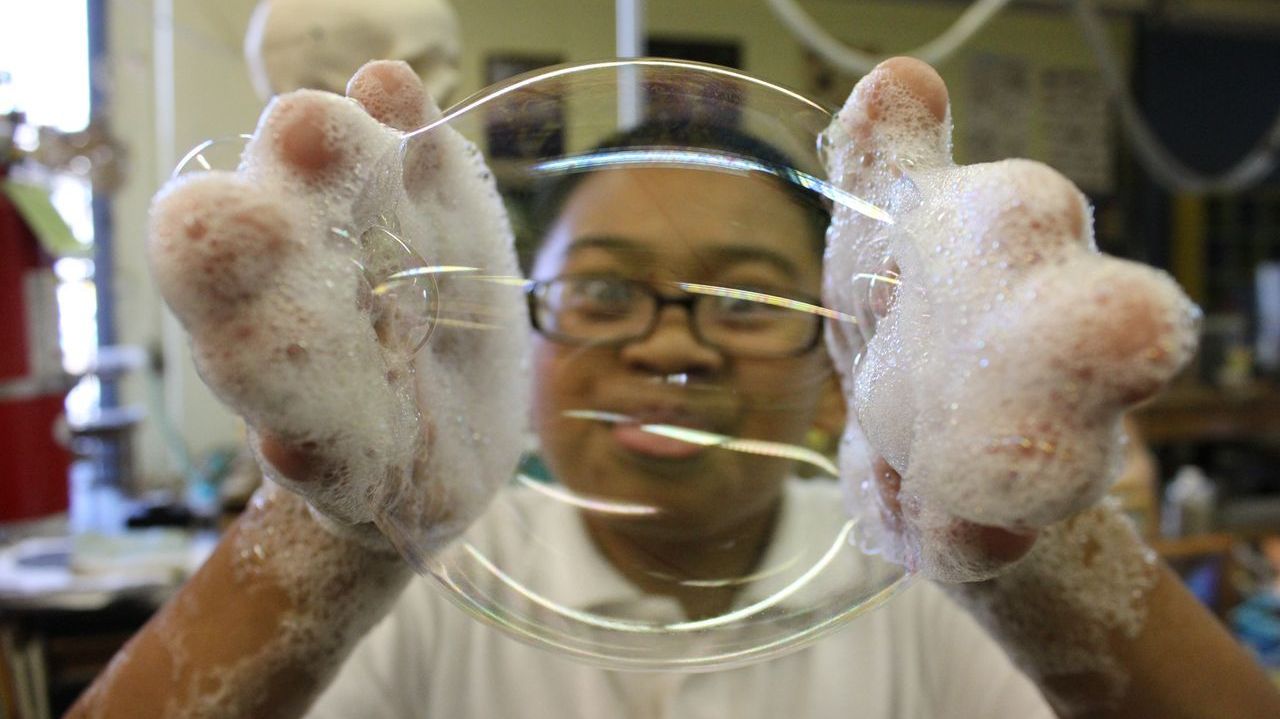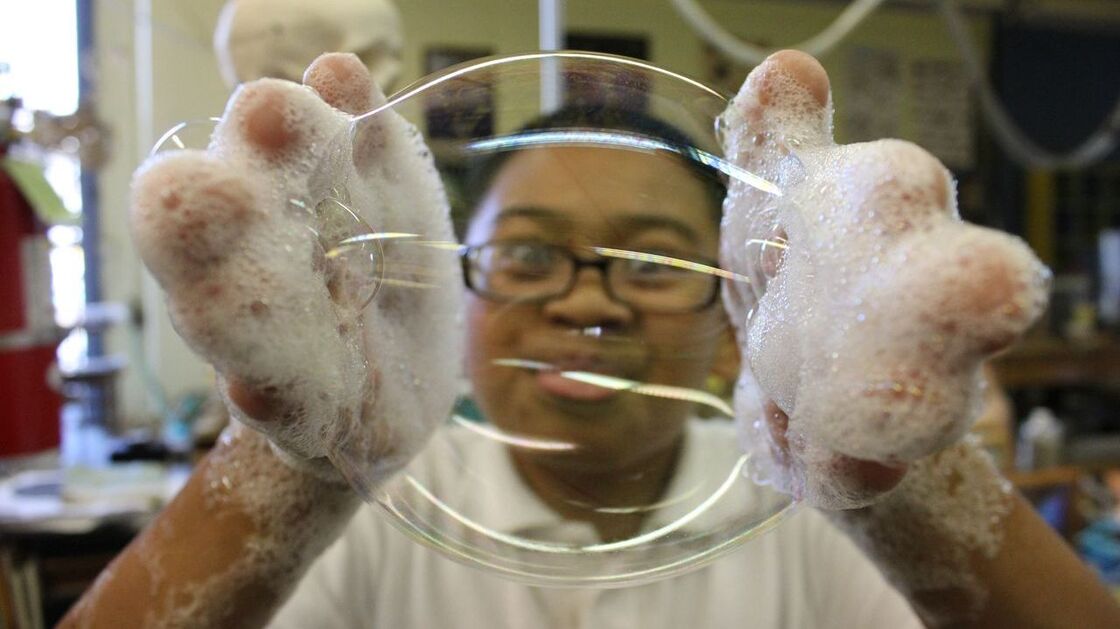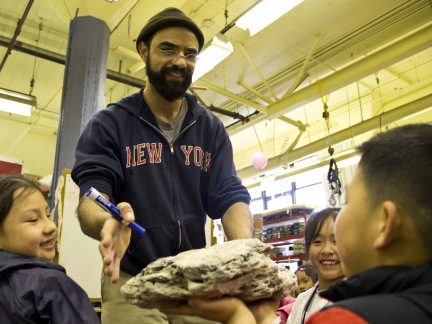Hands-on science activities like making bubble mitts at the Mission Science Workshop teach students about things like surface tension.
Hands-on science activities like making bubble mitts at the Mission Science Workshop teach students about things like surface tension.
Justin Jach/Courtesy of Mission Science WorkshopAre American kids being adequately prepared in the sciences to compete in a highly competitive, global high-tech workforce? A majority of American parents say no, according to a poll by NPR, the Robert Wood Johnson Foundation and the Harvard School of Public Health.
Nearly one-quarter of all parents said their child's school today doesn't put enough emphasis on science curricula. And 30 percent of parents with children in kindergarten up through fifth grade say there's too little emphasis on science.
"We want to see these kids get excited about science and math. We're lagging!" says Elizabeth Hall, one poll respondent and a mother of two who lives in California's sprawling central valley north of Fresno.
Hall says her state has created a culture of testing that has resulted in high rates of teacher burnout and low expectations. Her community, she laments, has made peace with academic mediocrity in the sciences.
'It's Just Another Class'
One of Hall's daughters, a high school sophomore, is so frustrated and underwhelmed by her district's biology and chemistry classes that she is reconsidering her once-strong desire to train for a medical career.
"There's no enthusiasm from the teachers. There's no love of science. There's no showing these young people that science is important in their lives. It's just another class," Elizabeth Hall says.
Her daughter, 15-year-old Grace Hall, says there are solutions, in her view: Help show me how science is relevant to my life and my future job prospects, she says, and go deeper into how students arrive at answers.
Teacher Aaron Martin and his class examine lava rocks before making their own at the Mission Science Workshop.
"Right now, [in] chemistry it seems like, why are we learning this?" Grace says. It would be a better learning experience, she says, "if we were almost forced to really understand instead of just memorizing things ... and [went] more in-depth in knowing why the answer is that answer."
State and federal statistics show that at least one-third of all students entering higher education programs today need some kind of remedial or developmental course work. That fact underscores a worry about a widening science-skills gap that is shared by many parents, educators and some in business and academia.
International tests show that American students just aren't measuring up, especially in math and science. The recent Program For International Student Assessment (PISA) study shows that the U.S. ranks 28th globally in science.
"Making room for science, that is a big problem," says Mary Colson, an eighth-grade Earth science teacher in Moorhead, Minn. "In the elementary schools now, the push is often for reading and math minutes. And science and social studies often get left out because there is just not enough time," she says. "That's unfortunate, because often kids can't help themselves but be curious about the natural world."
Getting Kids Psyched for Science
On a recent afternoon in San Francisco, nine-year-olds from Paul Revere Elementary in the Bernal Heights neighborhood are captivated by a large Van de Graaff electrostatic generator — and the prospect of gently zapping a reporter. They implore me to put the metal part of my microphone on the machine — all in the name of science, of course.
It's semi-controlled chaos here, but that's the point. This is free-form explore time at the Mission Science Workshop in San Francisco. The program works with low-income and under-served public elementary schools to get kids excited about science. The program does it by mixing lots of hands-on learning with specific experiments that teachers can continue back in their own classrooms.
There are a lot of live reptiles, whole animal skeletons and a handful of project stations throughout the room, a large former high school auto shop-turned science lair. Think mad scientist meets Willy Wonka, with limited impulse controls. Fourth-graders Matthew Rivera and Jamal Damon gently tussle over two pythons while teacher Sarah-Jayne Reilly stands by.
"I grew up in Ireland and really didn't do science until I was much older," Reilly says. "And when I came here the first time my mind was like, 'Wow! I just love the way the children are learning to think.'
"We always tell them, 'Don't just believe me, try it for yourself, test it for yourself. It's OK to be wrong. It's OK to say what you're thinking,'" she says.
For teacher Sam Haynor, the Science Workshop is about using imaginative experimentation to spark learning, and to counter the idea that science is a set of known facts that students should sit back quietly and receive from on high.
"The idea of this place is really to say that it's constructive — that you have to build, you have to try," Haynor says. "You have to experiment and fail and learn again. And that science really is just a quest to learn the truth."
For example, he explains, maybe it's easier for some kids to learn about math and science by helping to make something that serves a real-world function, like a circuit.
Making Time 'For Students To Explore'
It's not all free-form exploration. After the pandemonium subsides, students semi-calmly work to build terrariums as they explore the life cycle of plants.
"When they explore they're excited. They find things they are interested in," says Paul Revere Elementary teacher Jessica Huang, who takes her classes to the workshop regularly. "They want to go back to school and check out books about things that they've explored.
"So I see it as a way of really opening their eyes to things that they didn't know that they would even be interested in," she adds.
It's perhaps the kind of elementary school science program that many parents in NPR's education poll say is missing in their own communities.
Minnesota teacher Mary Colson has helped write a new set of national science standards called Next Generation Science Standards. The standards emphasize getting kids engaged in practicing science, she says, and to get more students to think like scientists.
"Reduce the amount of information, reduce the number of facts that we ask kids to cram into their heads, so that there is time in the school day for students to explore, to try things out and then ... go back and revisit their ideas," she says. "So the shift in vision by [Next Generation] would put kids in more active charge of their learning."
That's a chaotic kind of classroom to manage, but it's key, Colson says, to getting more students get out of the science boredom rut and saying, "This is real. It makes sense. It's interesting."
17 Dec, 2013
-
Source: http://www.npr.org/2013/12/17/251675532/to-make-science-real-kids-want-more-fun-and-fewer-facts?ft=1&f=1007
--
Manage subscription | Powered by rssforward.com




0 comments:
Post a Comment